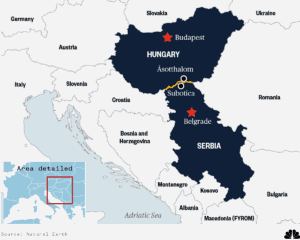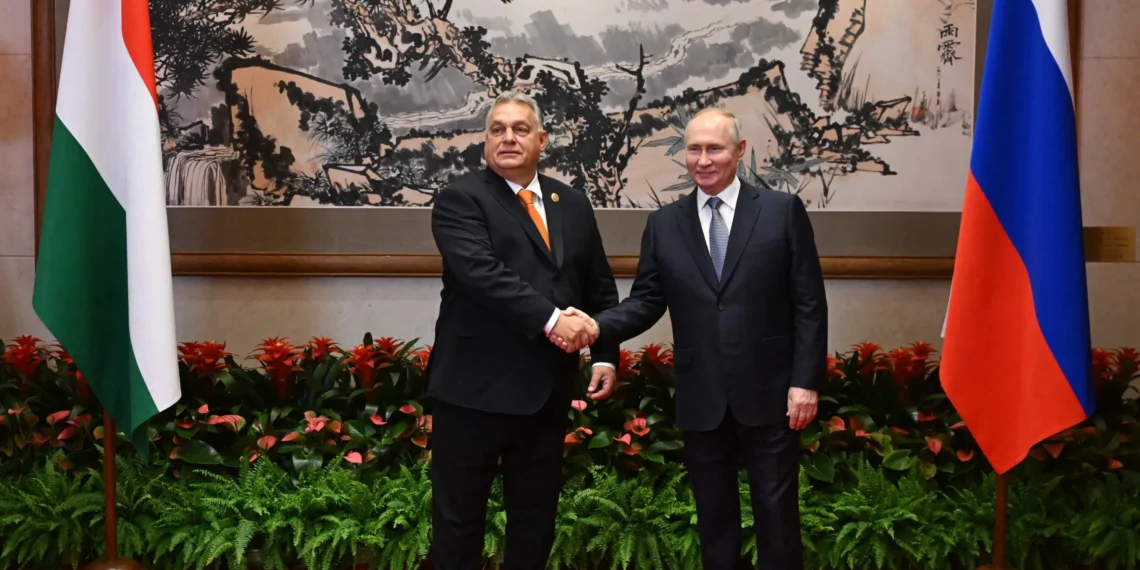Amid intensifying efforts by the European Union to reduce dependence on Russian energy, Hungary and Serbia have announced plans to jointly build a new oil pipeline, with Russia playing a pivotal supply and support role.
This trilateral initiative, unveiled by Hungarian Foreign Minister Péter Szijjártó in July 2025, highlights the emergence of alternative economic alliances within Europe that challenge the EU’s unified stance on Moscow and complicate the bloc’s energy diversification agenda.

Strategic Intent
The planned oil pipeline, expected to transport 4 to 5 million tons of crude annually, is set to become operational by 2027. Hungary will be responsible for constructing approximately 180 kilometers of the pipeline on its soil, particularly along the Százhalombatta-Algyő-Röszke corridor, while Serbia will build around 120 to 128 kilometers linking from the Hungarian village of Algyő to the Serbian city of Novi Sad — a key industrial hub.
The pipeline will connect directly to the Druzhba (“Friendship”) pipeline, the main conduit for Russian oil imports that serves parts of Central and Eastern Europe. The project will be developed by Hungary’s MOL Group and Serbia’s Transnafta, the respective national oil pipeline operators.
As Hungarian Foreign Minister Szijjártó emphasized, the pipeline is not just an energy project but a strategic safeguard against rising energy costs driven by EU sanctions aimed at severing Russian oil and gas imports. He bluntly criticized Brussels’ policies, asserting, “Brussels wants to cut us off from Russian oil and gas, forcing Hungarian families to pay two to four times more. We won’t allow that.” The new pipeline is intended to protect Hungary’s long-standing utility cost reduction program and ensure affordable energy supplies for households and businesses.
Hungary’s Defiance Within the EU
Hungary’s pursuit of this project starkly contrasts with the broader EU strategy under the “RePower EU” plan, which aims to end Russian fossil fuel imports by 2027 to weaken Moscow financially amid the ongoing Ukraine conflict. Budapest has consistently opposed these sanctions, warning that cutting off Russian energy would severely harm its economy and lead to steep increases in household electricity and heating bills, as over 80% of Hungary’s oil imports currently arrive via the Druzhba pipeline.
This pipeline project can be seen as Hungary’s economic and political pushback against what it views as detrimental EU policies. While Hungary is an EU member state with voting rights and commitments under the bloc’s regulations, its government under Prime Minister Viktor Orbán has maintained a pragmatic and sometimes contentious relationship with Brussels, particularly on energy and rule-of-law issues. By deepening energy ties with Russia and Serbia, Hungary asserts its national interests, prioritizing energy security and cost stability over full alignment with EU sanctions.
Serbia’s Energy and Regional Cooperation Interests
For Serbia, already heavily reliant on Russian oil and gas, the pipeline offers an alternative route to circumvent potential EU restrictions, especially after supply disruptions caused by Croatia’s enforcement of EU sanctions on Russian oil transit. Serbia’s Energy Minister Dubravka Djedović-Handanović described the project as “one of Serbia’s most important strategic energy projects,” emphasizing it would enhance energy security, reduce dependence, and strengthen Serbia’s position both regionally and in Europe.
The Hungary-Serbia partnership on energy infrastructure extends beyond oil. In recent years, the two countries have jointly invested in gas infrastructure, including a gas interconnector and shared storage facilities, underscoring their intertwined energy security interests and mutual reliance.
Russia’s Role and the Geopolitical Implications
Although Hungarian Foreign Minister Szijjártó did not detail Russia’s exact role in this venture, Russian Deputy Prime Minister Alexander Novak previously indicated Moscow’s readiness to support construction and supply oil to the pipeline. This suggests the project serves Moscow’s strategic objective of sustaining energy exports to Europe despite EU sanctions. By facilitating alternative delivery routes, Russia mitigates the impact of EU and Western efforts to isolate its energy sector.
The pipeline symbolizes a broader geopolitical realignment in Europe. It illustrates how certain EU member states and neighboring non-EU countries pursue economic ties with Russia that run counter to the bloc’s unified sanctions regime. This fractures European energy policy coherence and exposes diverging national interests within the continent.
Economic Alliances Amidst EU-Russia Tensions
The Hungary-Serbia pipeline project epitomizes the growing complexity of Europe’s energy landscape against the backdrop of the EU-Russia confrontation. As Brussels pushes for sanctions to weaken Russia’s war-fighting capacity in Ukraine, countries like Hungary assert their energy sovereignty, building partnerships that sustain Russian energy flows.
The move is also part of a larger trend of regional cooperation between Hungary and Serbia to enhance energy interdependence, infrastructure integration, and cost mitigation in a volatile geopolitical environment. It underscores that EU policies do not have uniform support across member states and neighboring countries, revealing cracks in European unity on energy security.
Also Read: EU draws its plans as Hungary and Orbán attempt to block Russia sanctions
The planned oil pipeline linking Hungary, Serbia, and Russia marks a significant development in Europe’s evolving energy geopolitics. While the EU drives toward decoupling from Russian fossil fuels to support Ukraine and constrain Moscow’s economic power, Hungary and Serbia are forging pragmatic economic alliances that sustain Russian energy imports and challenge EU sanctions enforcement.
This project not only reflects Hungary’s assertive stance within the EU but also signals the emergence of alternative economic blocs in Europe centered on energy security and national interests. It complicates the EU’s ability to present a united front against Russia and underscores Europe’s fragmented geopolitical contours amid ongoing regional tensions.








